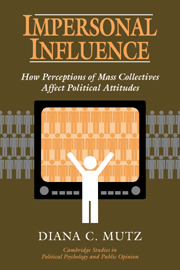Book contents
- Frontmatter
- Contents
- List of Figures
- List of Tables
- Preface
- Acknowledgments
- Part I Theory and Historical Context
- 1 The Generalized Other: Social Influence in Contemporary American Politics
- 2 Beyond Personal Influence: The Rise of Impersonal Associations
- 3 The Origins of Perceptions of Mass Collectives: Mass Media's Role
- Part II Effects of Perceptions of Mass Experience
- Part III Effects of Perceptions of Mass Opinion
- Part IV Conclusion
- Appendix: Methodology
- References
- Index
2 - Beyond Personal Influence: The Rise of Impersonal Associations
Published online by Cambridge University Press: 05 June 2012
- Frontmatter
- Contents
- List of Figures
- List of Tables
- Preface
- Acknowledgments
- Part I Theory and Historical Context
- 1 The Generalized Other: Social Influence in Contemporary American Politics
- 2 Beyond Personal Influence: The Rise of Impersonal Associations
- 3 The Origins of Perceptions of Mass Collectives: Mass Media's Role
- Part II Effects of Perceptions of Mass Experience
- Part III Effects of Perceptions of Mass Opinion
- Part IV Conclusion
- Appendix: Methodology
- References
- Index
Summary
In outlining the increased importance of impersonal forms of social influence in contemporary American society, I have focused thus far on changes in the nature of mass communication that have transpired over the last century. But to look at changes in mass communication alone would miss the tremendous significance of parallel changes in interpersonal social relationships. Moreover, to locate the roots of this trend exclusively in the present century would be to overlook important relationships between impersonal influence and large-scale economic and social changes that date back to the founding of the country. Although the impact of changes in mass communication has undoubtedly been enormous, I begin this chapter by sketching the backdrop against which these changes occurred. Major transformations in the nature of social relationships paved the way for the four major trends in the structure and content of media that have facilitated impersonal influence: the nationalization of mass media, rising media attention to portrayals of collective experience, the decline of event-centered news coverage, and widespread belief in the power of media in the political process.
TRANSFORMATION OF AMERICAN SOCIAL RELATIONSHIPS
Historian Gordon Wood has argued that although the American Revolution was very conservative by such standards as the number of fatalities or the amount of economic deprivation that transpired, “if we measure the radicalism by the amount of social change that actually took place – by transformations in the relationships that bound people to each other – then the American Revolution was not conservative at all; on the contrary: it was as radical and as revolutionary as any in history” (Wood 1991: 5).
- Type
- Chapter
- Information
- Impersonal InfluenceHow Perceptions of Mass Collectives Affect Political Attitudes, pp. 26 - 61Publisher: Cambridge University PressPrint publication year: 1998



